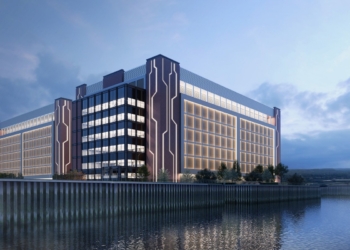Fibre overlooked in UK, delaying 82% of DC projects
Author: Joe Peck

Neos Networks, a UK-based B2B connectivity provider, today revealed that 82% of UK data centre operators have delayed site builds or expansion due to fibre availability.
95% of these operators say that access to new, high-capacity fibre networks will now influence their expansion plans.
The findings come from new research showing that, despite unprecedented government and enterprise momentum around data centre development and artificial intelligence (AI), fibre remains the critical bottleneck that could slow the UK’s digital growth.
However, Neos says the industry is united on the solution: investment in new, high-capacity fibre backbones.
The study, carried out in partnership with Censuswide, surveyed data centre operators, enterprise IT leaders and local government stakeholders. Across all three groups, there was a consensus that core fibre networks are the foundation of the UK’s AI infrastructure:
• 89% of local government stakeholders report that fibre gaps have delayed infrastructure projects in their regions.
• Almost half (45%) of enterprises cite fibre as the key bottleneck holding back AI and digital infrastructure.
• Almost half (46%) of local government authorities say their region’s fibre infrastructure is not fully ready to support AI data centres.
• One in six companies (16%) doubt the ability of the UK’s current fibre infrastructure to support their AI ambitions.
Lee Myall, CEO of Neos Networks, comments, “Over the past decade, we’ve seen a huge amount of investment in last-mile fibre builds, but core fibre networks across the country have received much less attention. Without them, workloads cannot move between data centres, data cannot be trained, and investments stall.
“The UK has the ambition, the demand and the regional readiness to lead in AI, but if we don’t address fibre gaps, we risk losing out on one of the greatest economic opportunities of our generation.”
AI is reshaping data centre and digital strategy
The UK government has set out its ambition to position the country as a global leader in AI, with initiatives such as AI Growth Zones in the AI Opportunities Action Plan central to this vision. The research shows these policies are already shaping investment and strategy across the ecosystem:
• 96% of data centre operators say AI Growth Zones are influencing expansion and site selection, with 44% citing them as a strong influence.
• 68% of enterprises view AI Growth Zones as a strong driver of change in their infrastructure planning.
Importantly, this momentum is fuelling new growth corridors beyond London.
While 23% of data centre operators still expect new investment in Greater London, a greater share pointed to the North of England and the Midlands (39%), signalling a shift towards regional hubs of AI activity.
This diversification is mirrored in the way compute is being deployed.
With data centre sites becoming more dispersed, almost all (97%) data centre operators expect up to half of their UK compute to move to the edge of the network by 2030, underlining the need for high-performance, resilient fibre across every region.
But despite this momentum, concerns remain:
• 41% of data centre leaders believe the UK’s fibre networks are only partially prepared to support regional AI workloads.
• More than 70% of enterprises feel the UK’s attractiveness for data centre investment needs improvement (53%) or is lagging (17%).
Unlocking opportunity through new fibre backbones
The research highlights a path forward, with new fibre backbone projects critical to unlocking growth. Nearly all respondents agree that investment in high-capacity fibre corridors will transform confidence in the UK’s ability to attract and scale AI projects:
• 95% of data centre operators, 96% of enterprises, and 96% of local authorities say new fibre corridors into underserved areas would positively impact AI and data centre growth.
• More than half of local authorities (53%) believe such projects would be transformative for their regions.
Lee concludes, “AI is no longer a future ambition; it’s here today, reshaping how businesses, communities, and governments operate.
“But the UK cannot lead in AI on yesterday’s infrastructure and we need continued investment in the fibre backbones that connect every region of the country.
“At Neos, we’re committed to building those foundations so the UK can not only keep pace, but compete and thrive in the global AI race.”
For more from Neos Networks, click here.








